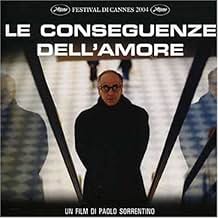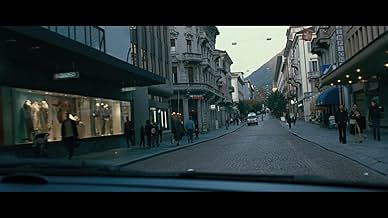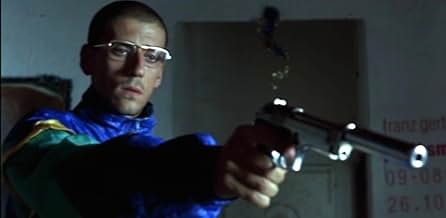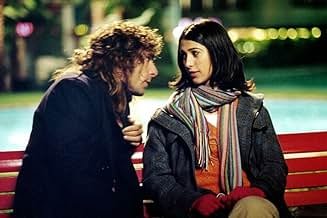Le conseguenze dell'amore
- 2004
- 1 घं 40 मि
IMDb रेटिंग
7.5/10
20 हज़ार
आपकी रेटिंग
एक युवा बार-मेड के आकर्षण में पड़कर एक अंतर्मुखी आदमी का जीवन पूरी तरह से बदल जाता है.एक युवा बार-मेड के आकर्षण में पड़कर एक अंतर्मुखी आदमी का जीवन पूरी तरह से बदल जाता है.एक युवा बार-मेड के आकर्षण में पड़कर एक अंतर्मुखी आदमी का जीवन पूरी तरह से बदल जाता है.
- पुरस्कार
- 20 जीत और कुल 21 नामांकन
Vincenzo Vitagliano
- Pippo D'Antò
- (as Enzo Vitagliano)
फ़ीचर्ड समीक्षाएं
I saw this the week it opened four years ago and I really did not know what to expect being unfamiliar with Sorrentino's work at the time. He has created a very intriguing and ultimately moving account of an odd character, one for whom the phrase 'life is for living' no longer applies. It outwitted me at every turn and I was constantly surprised by the story. I enjoyed the pacing very much and the way I was gradually given the pieces to work out what was happening. Tony Servillo is superb, as is Magnani. It opens with a brilliantly stylish wide shot and concludes with a very moving image that takes the movie into sublime territory. I thought long afterwards about the main character and the position he was in and his final fate and I didn't shake it for weeks. I recently bought the film and that final scene where he thinks about his friend gets me every time. I still have yet to talk to anyone who has seen this. It's a shame that it did not reach a wider audience as if this is the direction of Italian cinema it can only be a good thing.
This is a very visual film. By that I mean that the dialog is sparse, almost to the point of being a silent movie for some very long takes, beginning with the opening shot.
The silences, however, are broken by a stunning sound track that ranges from discordant, staccato beats to a haunting mix of violins, and interspersed with vocals that sound like dreams. It's a feast for the ears as much as for the eyes, one of the early visuals being a man walking along a street, so preoccupied with his interest in a shapely woman, that he walks into a lamppost: one of the consequences of love and a metaphor for what lies in store...
A long time ago, another movie Love Story (1970) -- said that love is never having to say you're sorry. This narrative turns that idea on its head in a number of ways, beginning with the main character, Titta (Toni Sevillo), a seemingly innocuous long-term resident in a plush hotel somewhere in Switzerland. Everyday, week in, week out, he sits at the same coffee table, enjoying the passing world, his cigarettes, his coffee, his solitude and he's been doing it for ten years. He sits, he observes, and once a week he engages in three very surprising activities that you'll find out about when you see this little masterpiece...
Love is explored in another way, in a direct counterpoint to Titta's solitude and reserved nature: two older residents of the hotel are still much in love, but the man wants to die in a spectacular manner when his time comes, while his long suffering wife berates him for cheating at cards with the other guests, one of whom is Titta. Now, Titta knows about their squabbles, their love, the man's cheating, his apologies to his wife, and his whining. How? In a surprising and black-comedic manner...one of those surprise activities I mentioned.
But, this is no comedy, in reality, although it does touch upon the idea of the human comedy in a Balzacian sense: the irony of life and what to do with it. That decision had been made for Titta ten years earlier when he left his wife and began to live in the hotel. He keeps in touch occasionally, and it is clear that he still loves his children (now grown up) and the sorrow in his voice speaks volumes. But, there's something more than just sorrow...
Such a life as Titta's would obviously seem to be utterly boring, and it actually is from many perspectives. It is only when we learn what lies beneath his almost death-like countenance, however, that the horror of his situation hits the viewer between the eyes. But not before we know that the female bartender, Sofia (Olivia Magnani), is very interested in Titta and goes out of her way to pique Titta's interest in her.
And that's when things start to unravel for Titta: he eventually succumbs to her femininity and in doing so discovers, once again, the consequences of love. Ironically, in doing so, he finally realizes what he must finally do with his life, and in a most spectacular fashion.
I know that all of the above is somewhat cryptic; but, to say more would spoil the film and story for you. If you like Italian cinema I love it! I urge you to see this one. The acting is superb; the sound track chills the spine; the camera work is truly innovative; the direction shows the maturity of a true artist.
I know I'll see this movie again, and again...
The silences, however, are broken by a stunning sound track that ranges from discordant, staccato beats to a haunting mix of violins, and interspersed with vocals that sound like dreams. It's a feast for the ears as much as for the eyes, one of the early visuals being a man walking along a street, so preoccupied with his interest in a shapely woman, that he walks into a lamppost: one of the consequences of love and a metaphor for what lies in store...
A long time ago, another movie Love Story (1970) -- said that love is never having to say you're sorry. This narrative turns that idea on its head in a number of ways, beginning with the main character, Titta (Toni Sevillo), a seemingly innocuous long-term resident in a plush hotel somewhere in Switzerland. Everyday, week in, week out, he sits at the same coffee table, enjoying the passing world, his cigarettes, his coffee, his solitude and he's been doing it for ten years. He sits, he observes, and once a week he engages in three very surprising activities that you'll find out about when you see this little masterpiece...
Love is explored in another way, in a direct counterpoint to Titta's solitude and reserved nature: two older residents of the hotel are still much in love, but the man wants to die in a spectacular manner when his time comes, while his long suffering wife berates him for cheating at cards with the other guests, one of whom is Titta. Now, Titta knows about their squabbles, their love, the man's cheating, his apologies to his wife, and his whining. How? In a surprising and black-comedic manner...one of those surprise activities I mentioned.
But, this is no comedy, in reality, although it does touch upon the idea of the human comedy in a Balzacian sense: the irony of life and what to do with it. That decision had been made for Titta ten years earlier when he left his wife and began to live in the hotel. He keeps in touch occasionally, and it is clear that he still loves his children (now grown up) and the sorrow in his voice speaks volumes. But, there's something more than just sorrow...
Such a life as Titta's would obviously seem to be utterly boring, and it actually is from many perspectives. It is only when we learn what lies beneath his almost death-like countenance, however, that the horror of his situation hits the viewer between the eyes. But not before we know that the female bartender, Sofia (Olivia Magnani), is very interested in Titta and goes out of her way to pique Titta's interest in her.
And that's when things start to unravel for Titta: he eventually succumbs to her femininity and in doing so discovers, once again, the consequences of love. Ironically, in doing so, he finally realizes what he must finally do with his life, and in a most spectacular fashion.
I know that all of the above is somewhat cryptic; but, to say more would spoil the film and story for you. If you like Italian cinema I love it! I urge you to see this one. The acting is superb; the sound track chills the spine; the camera work is truly innovative; the direction shows the maturity of a true artist.
I know I'll see this movie again, and again...
OK, I'm Italian but there aren't so many Italian film like this. I think that the plot is very good for 3/4 of the film but the final is too simple, too predictable. But it's the only little mistake. The Consequences of Love in my opinion have great sequences in particular at the beginning and great soundtrack. I'd like very much the lighting work on it. The best thing on it is a great, great actor. You know, if your name were Al Pacino now everybody would have still been talking about this performance. But it's only a great theater Italian actor called Toni Servillo. Yes, someone tell me this film and this kind of performance it's too slow, it's so boring, so many silences, but i think that this components its fantastic, its the right way for describing the love story between a very talented young girl, the grand-daughter of the Italian actress Anna Magnani, Olivia and the old mysterious man Toni. One of my favorite Italian films.
One of the most significant quotes from the entire film is pronounced halfway through by the protagonist, the mafia middle-man Titta Di Girolamo, a physically non-descript, middle-aged man originally from Salerno in Southern Italy. When we're introduced to him at the start of the film, he's been living a non-life in an elegant but sterile hotel in the Italian-speaking Canton of Switzerland for the last ten years, conducting a business we are only gradually introduced to. While this pivotal yet apparently unremarkable scene takes place employees of the the Swiss bank who normally count Di Girolamo's cash tell him that 10,000 dollars are missing from his usual suitcase full of tightly stacked banknotes. At the news, he quietly but icily threatens his coaxing bank manager of wanting to close down his account. Meanwhile he tells us, the spectators, that when you bluff, you have to bluff right through to the end without fear of being caught out or appearing ridiculous. He says: you can't bluff for a while and then halfway through, tell the truth. Having eventually done this - bluffed only halfway through and told the truth, and having accepted the consequences of life and ultimately, love - is exactly the reason behind the beginning of Titta Di Girolamo's troubles.
This initially unsympathetic character, a scowling, taciturn, curt man on the verge of 50, a man who won't even reply in kind to chambermaids and waitresses who say hello and goodbye, becomes at one point someone the spectator cares deeply about. At one point in his non-life, Titta decides to feel concern about appearing "ridiculous". The first half of the film may be described as "slow" by some. It does indeed reveal Di Girolamo's days and nights in that hotel at an oddly disjoined, deliberate pace, revealing seemingly mundane and irrelevant details. However, scenes that may have seemed unnecessary reveal just how essential they are as this masterfully constructed and innovative film unfolds before your eyes. The existence of Titta Di Girolamo - the man with no imagination, identity or life, the unsympathetic character you unexpectedly end up loving and feeling for when you least thought you would - is also conveyed with elegantly edited sequences and very interesting use of music (one theme by the Scottish band Boards of Canada especially stood out).
Never was the contrast between the way Hollywood and Italy treat mobsters more at odds than since the release of films such as Le Conseguenze dell'Amore or L'Imbalsamatore. Another interesting element was the way in which the film made use of the protagonist's insomnia. Not unlike The Machinist (and in a far more explicit way, the Al Pacino film Insomnia), Le Conseguenze dell'Amore uses this condition to symbolise a deeper emotional malaise that's been rammed so deep into the obscurity of the unconscious, it's almost impossible to pin-point its cause (if indeed there is one).
The young and sympathetic hotel waitress Sofia (played by Olivia Magnani, grand-daughter of the legendary Anna) and the memory of Titta's best friend, a man whom he hasn't seen in 20 years, unexpectedly provide a tiny window onto life that Titta eventually (though tentatively at first) accepts to look through again. Though it's never explicitly spelt out, the spectator KNOWS that to a man like Titta, accepting The Consequences of Love will have unimaginable consequences. A film without a single scene of sex or violence, a film that unfolds in its own time and concedes nothing to the spectator's expectations, Le Conseguenze dell'Amore is a fine representative of that small, quiet, discreet Renaissance that has been taking place in Italian cinema since the decline of Cinecittà during the second half of the 70s. The world is waiting for Italy to produce more Il Postino-like fare, more La Vita è Bella-style films... neglecting to explore fine creations like Le Conseguenze dell'Amore, L'Imbalsamatore and others. Your loss, world.
This initially unsympathetic character, a scowling, taciturn, curt man on the verge of 50, a man who won't even reply in kind to chambermaids and waitresses who say hello and goodbye, becomes at one point someone the spectator cares deeply about. At one point in his non-life, Titta decides to feel concern about appearing "ridiculous". The first half of the film may be described as "slow" by some. It does indeed reveal Di Girolamo's days and nights in that hotel at an oddly disjoined, deliberate pace, revealing seemingly mundane and irrelevant details. However, scenes that may have seemed unnecessary reveal just how essential they are as this masterfully constructed and innovative film unfolds before your eyes. The existence of Titta Di Girolamo - the man with no imagination, identity or life, the unsympathetic character you unexpectedly end up loving and feeling for when you least thought you would - is also conveyed with elegantly edited sequences and very interesting use of music (one theme by the Scottish band Boards of Canada especially stood out).
Never was the contrast between the way Hollywood and Italy treat mobsters more at odds than since the release of films such as Le Conseguenze dell'Amore or L'Imbalsamatore. Another interesting element was the way in which the film made use of the protagonist's insomnia. Not unlike The Machinist (and in a far more explicit way, the Al Pacino film Insomnia), Le Conseguenze dell'Amore uses this condition to symbolise a deeper emotional malaise that's been rammed so deep into the obscurity of the unconscious, it's almost impossible to pin-point its cause (if indeed there is one).
The young and sympathetic hotel waitress Sofia (played by Olivia Magnani, grand-daughter of the legendary Anna) and the memory of Titta's best friend, a man whom he hasn't seen in 20 years, unexpectedly provide a tiny window onto life that Titta eventually (though tentatively at first) accepts to look through again. Though it's never explicitly spelt out, the spectator KNOWS that to a man like Titta, accepting The Consequences of Love will have unimaginable consequences. A film without a single scene of sex or violence, a film that unfolds in its own time and concedes nothing to the spectator's expectations, Le Conseguenze dell'Amore is a fine representative of that small, quiet, discreet Renaissance that has been taking place in Italian cinema since the decline of Cinecittà during the second half of the 70s. The world is waiting for Italy to produce more Il Postino-like fare, more La Vita è Bella-style films... neglecting to explore fine creations like Le Conseguenze dell'Amore, L'Imbalsamatore and others. Your loss, world.
Although I totally agree with the previous comment regarding the marvellous acting of Toni Servillo as Titta Di Girolamo, I would also like to add the beautiful filming and montage which turns this movie virtually into a painting. The young director Paolo Sorrentino had the courage to experiment with different types of camera techniques which reminded me of Darren Aronofsky' Requiem for a Dream. They both used the same MTV-style filming combined with modern (alternative/techno) music, making the film Le Consequenze dell'Amore - stand apart from the other crime/mafia movies in its genre. Even though the movie may start of very slow-paced almost "sec" compared to the faster Hollywood productions it should be enjoyed cause of its serenity, marvellous character portray and splendid ending. Definitely a must see for people who enjoy the European/Italian cinema. PS Toni keep on acting like this we need an encore.
क्या आपको पता है
- ट्रिवियाThe book the girl at the table reads is Louis-Ferdinand Céline's "Voyage au bout de la Nuit" (1932).
- गूफ़The barrel of the tracksuit-clad assassin's fired gun, lying on the hotel mattress while the assassin is packing for departure, appears defective, i.e., rubbery, as the silencer barrel is angled downward. Moments later, after he picks up the gun and points it at the hotel room door, the barrel appears longer and straighter, as it was in the earlier scenes.
- भाव
Titta: In the world there's a certain kind of cult, with men and women of all social classes, of all ages and of all religions. It is the insomniacs cult. I'm part of it. For ten years. Those who don't belong to the cult sometimes tend to say: "If you can't sleep, you can read, watch TV, study or do something else". That kind of phrase is deeply annoying to the members of the cult. And the reason is simple. Cause the insomniac has only one obsession: to sleep.
टॉप पसंद
रेटिंग देने के लिए साइन-इन करें और वैयक्तिकृत सुझावों के लिए वॉचलिस्ट करें
- How long is The Consequences of Love?Alexa द्वारा संचालित
विवरण
- रिलीज़ की तारीख़
- कंट्री ऑफ़ ओरिजिन
- आधिकारिक साइट
- भाषा
- इस रूप में भी जाना जाता है
- The Consequences of Love
- फ़िल्माने की जगहें
- उत्पादन कंपनियां
- IMDbPro पर और कंपनी क्रेडिट देखें
बॉक्स ऑफ़िस
- बजट
- €20,00,000(अनुमानित)
- दुनिया भर में सकल
- $25,56,056
- चलने की अवधि1 घंटा 40 मिनट
- रंग
- ध्वनि मिश्रण
- पक्ष अनुपात
- 2.35 : 1
इस पेज में योगदान दें
किसी बदलाव का सुझाव दें या अनुपलब्ध कॉन्टेंट जोड़ें

![Trailer [OV] देखें](https://m.media-amazon.com/images/M/MV5BYTE4NzdmOGQtOTU4OC00YTJlLThiYzQtYjkwZWZlMDEzMzVjXkEyXkFqcGdeQXRyYW5zY29kZS13b3JrZmxvdw@@._V1_QL75_UX500_CR0)
























